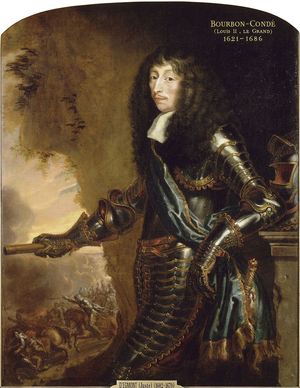 | |||||||||||||||||||||||
| |||||||||||||||||||||||
| |||||||||||||||||||||||
| |||||||||||||||||||||||
The 1674 Polish–Lithuanian royal election was an election to decide on the new candidate for the Polish–Lithuanian throne.
On November 10, 1673, Michael Korybut Wiśniowiecki, King of Poland and Grand Duke of Lithuania, suddenly died in Lwów. The Polish throne was vacant again, so another free election was necessary. As in 1669, the main candidates were French Duke Louis, Grand Conde, Philip William, Count Palatine of Neuburg (both supported by Louis XIV of France), and Charles V, Duke of Lorraine.
Hetman John Sobieski, who was a very influential figure in the Polish–Lithuanian Commonwealth, did not express interest in the Polish crown, and before the election stated that he did wish to be elected. Sobieski was hated by Lithuanian magnates of the Pac family, who in January 1674, during the Convocation Sejm, demanded that a bill prohibiting native Poles (or Piasts) from running in the election should be introduced.
The fact that the Pac family promoted such a bill means that Sobieski was regarded by many as a possible candidate. His name was mentioned by envoys of the House of Habsburg, and by French newspaper La Gazette. French diplomats later stated that Sobieski himself hesitated between running in the election, and supporting the Grand Conde.
The election began on Saturday, June 19, 1674. Despite the protests of Lithuanians, the Bishop of Kraków Andrzej Trzebicki initiated the process, by singing the hymn Veni Sancte Spiritus. The next day, Sunday, June 20, was dedicated to religious ceremonies and behind the scenes negotiations. On Monday, June 21, the Bishop of Vilnius, Michał Pac stated that Lithuania agreed to the Piast candidate. In the afternoon of the same day, John III Sobieski became King of Poland.
YouTube Encyclopedic
-
1/3Views:21 36317 740377
-
Free Royal Election
-
Polish-Ottoman War 1672-76 | 3 Minute History
-
Polish-Lithuanian army organization (XVII century)
Transcription
Eligibility was known in medieval and the early modern age, however there was nowhere such processing as there was here. That means open and public elections by the commonalty of citisens and what`s more, so numerous citisens. Elections are taking place under the sky, "Sub Deo", So providence is close to the electors. At the beginning there was sung "Veni Creator Spiritus" and after, thank the Holy Spirit for the inspiration on knees. Help of the providence could be useful in 1573, when the nobles right to election was questioned. Since Jagiello election was made by the Royal Council, "Senate". Decission belonged to the several dozens of lords. There was serious danger that magnatery will dominate elections. This was unacceptable for the paricipants of the "Execution movement", who knowed what means to share responsibility for the state. They didn`t wanted to be puppets, but the real electors. "We`re all defending Republic, we`re all decideing about our ruler." Such privillage was issued by the "Seym" in the constitution of 1538. Since then the future elections should be "free", without the internal pressure. Pressure of existing King, so there cannot be election during the monarch`s life. NO !!! NEVER !!! NO !!! Decission about the shape and place of the elections was made after Sigismund August died. Nobility maintained state during 'interregnum' and called the Elective meeting to Warsaw. The choice of Warsaw prejudged two things. During the "Seym" of Lublin Union, when there were joined Poland and Lithuania, people were looking for a place of the common diet, which would connect, not separate both. Warsaw is in Masovia, district which was recently merged with the Crown back than. It had comfortable connections. First election took part on the right side of Vistula, on the field of "Kamion" (present "Kamionek"). Since the second, elections will be on the field of "Wola" (Will), the "Great Wola". Participation was expensive and difficult, especially for the citizens from borderlines of "Rzeczpospolita". Under that communication`s conditions, it needed often two weeks to reach that field. Technical issues, preparation of the field, so called "trench", senator`s "Shop", cleaning after all of that... There was comeing lots of people. Elective Seyms were lasting about 50 days. Often the poorest were leaving first. There was whole "game", sometimes typical 'obstruction', to hold the people as long as possible, proceeding other issues, to tire these electors they, exhausted, would go back to thier places and make it easier to decide for the magnates. Election`s field was always place of the political games, sometimes bloody, unti foreign armies were participating Election remained one of the most important evidences of the civic participation in the politics If not the disaster of "partitions", we will be now proudly saying that we worked out the best way of choosing the head of state, exactly in the free and open... Elections
See also
- History of Poland in the Early Modern era (1569–1795)
- Royal elections in Poland
- Golden Liberty
- Henrician Articles
Sources
- U. Augustyniak, Historia Polski 1572–1795, Warszawa 2008 M. Markiewicz, Historia Polski 1494–1795, Kraków 2002




